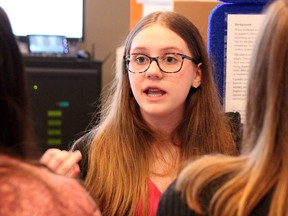
Sarnia’s Cynthia Rayson was doing what she loves, sharing her findings about science — and cleaning up in the process, punching her ticket to the national science fair with a project about the environmental impact of laundry detergents
Advertisement 2
Article content
The St. Anne’s eighth-grader said she’s been entering projects in science fairs since she was in Grade 3, testing things such as the effectiveness of bio-remediation, of sunscreen and how dish detergents affect worms.
Article content
Rayson, 13, was one of the Lambton County Science Fair winners last year who advanced to the national science fair, where she won silver.
Now, she’s going back again after winning a judge’s choice award Saturday at this year’s fair.
Her project, she said, tested the impacts of different laundry detergents on aquatic plants, micro-organisms and germinating seeds.
Most detergents proved not to be environmentally-friendly, she said, noting she formulated her own version that beat out all the others in environmentalism, and was second-best at removing stains.
Advertisement 3
Article content
“I have always loved (participating in the annual fair) more than anything,” she said.
Why so keen on science fairs?
Because she gets to meet new people and expand her knowledge, she said. Her interest in water and environmental sciences is partly due to her older sister, Annabelle, who’s now studying at Harvard University and is herself a former science fair champion.
Fifty-two projects were entered in this year’s fair, held at the Lambton College Event Centre, with the participation up slightly for the event still building back from the pandemic, said Peter Smith, one of the volunteer organizers.
Last year there were 37 entriesthough there were 94 in 2019.
Not held in 2020 after COVID-19 hit, the science fair moved online in 2021 in the pandemic’s fallout and returned to its normal format the following year.
Advertisement 4
Article content
“It takes time to establish that pattern again” of entering science fairs, Smith said, noting organizers were pleased with this year’s uptick in projects.
“We’ve got a lot of younger ones who have joined us this time, which is really good,” he said of participating students.
“Which means we can sort of build this up and, hopefully, keep some of them (students) right up to the senior level.”
The fair is open to students in Grades 3 to 12 and has four age-based categories.
Some entries this year were in French, which was new, Smith said.
Many entries focused on environmentalism, he said.
“It’s always a wide variety of things,” he said.
Heading with Rayson to nationals in Ottawa are Tej Patel, Riley Edmunds and Muhammad Mustafa Arif.
Arif’s brain-computer interface project won best junior and best of fair.
Patel’s, on using machine learning to predict heart disease, was named the senior-division best.
Edmunds’, on environmental impacts of road ice removal substances, received the Imperial Oil judges choice award, while Rayson’s received the TransCanada judges choice award.
Article content